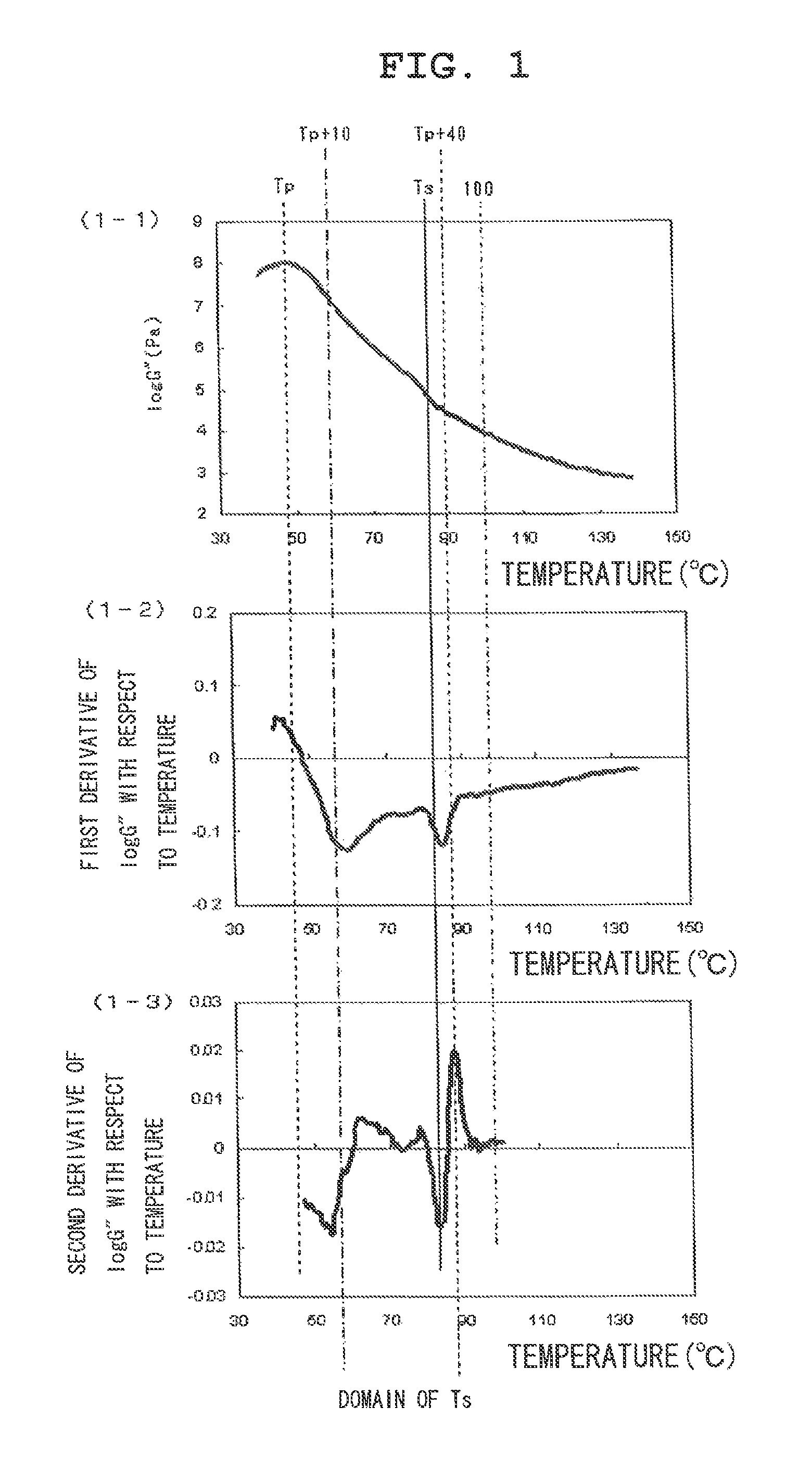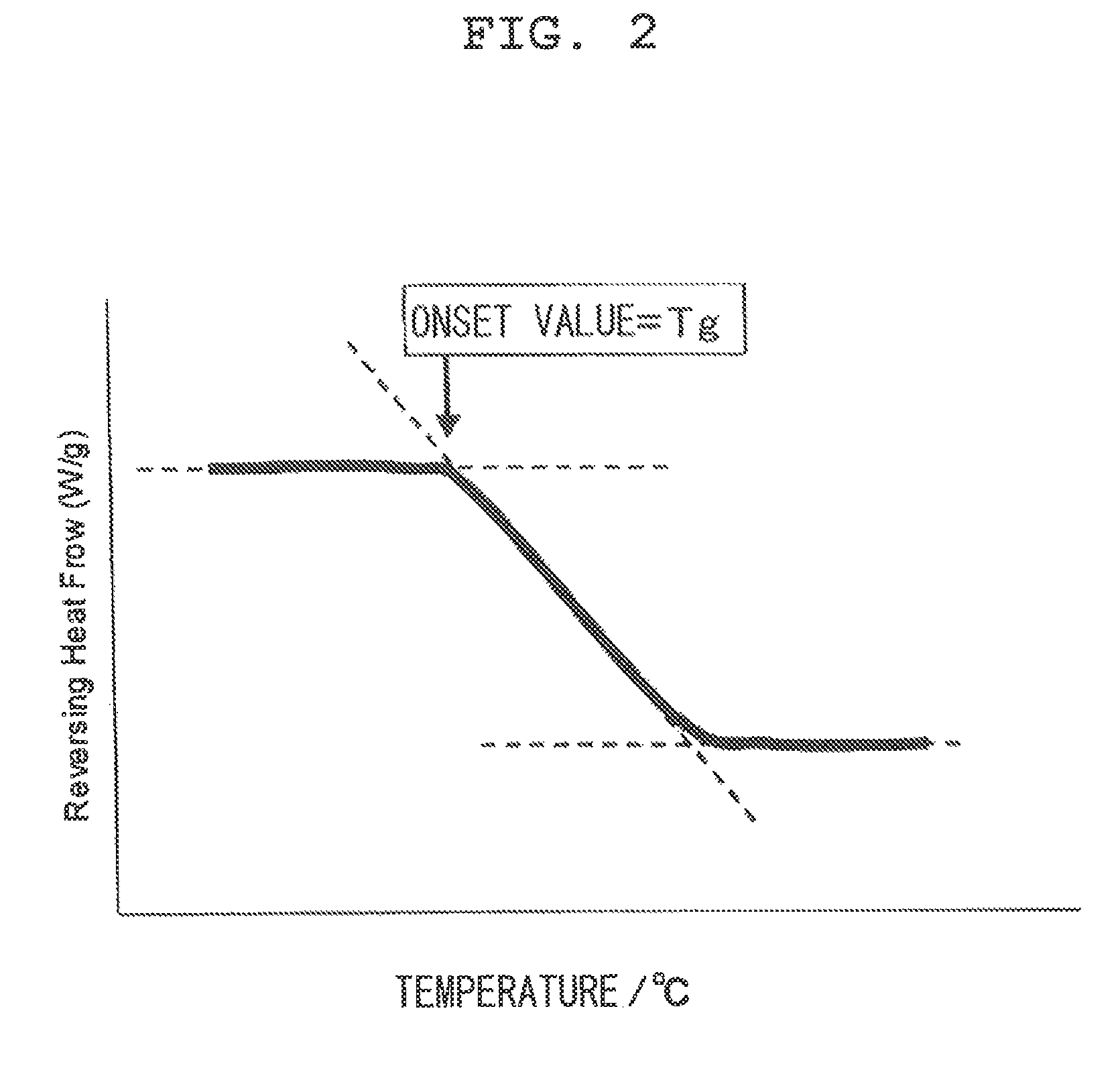Color toner
a technology of color toner and toner cartridge, which is applied in the field of color toner, can solve the problems of reducing the yield of toner, reducing the number of resin alternatives, and hardly achieving drastic improvement in low-temperature fixability of toner, and achieves excellent heat-resistant storage stability, low viscosity, and excellent performan
- Summary
- Abstract
- Description
- Claims
- Application Information
AI Technical Summary
Benefits of technology
Problems solved by technology
Method used
Image
Examples
example 1
Production of Toner Particles 1
[0394]Prior to the preparation of an aqueous phase, an ultrasonic wave was applied from an ice water-filled ultrasonic dispersing unit (UT-305HS manufactured by Sharp Corporation) to a beaker containing the liquid toner composition 1 at an output of 60% for 5 minutes in order that the wax and the pigment in the liquid toner composition might be loosened.
(Emulsifying and Desolvating Steps)
[0395]
Ion-exchanged water157 parts by mass The dispersion liquid of the resin fine particles 134 parts by mass(4 parts by mass of the resin fineparticles were loaded withrespect to 100 parts by mass of the tonerbase particles (A).)A 50% aqueous solution of sodium dodecyl24 parts by massdiphenyl ether disulfonate(ELEMINOL MON-7 manufactured bySanyo Chemical Industries Ltd.)Ethyl acetate18 parts by mass
[0396]The above materials were loaded into a beaker different from that containing the liquid toner composition, and the mixture was stirred with a TK HOMOMIXER (manufactu...
example 2
[0469]Toner particles were produced in the same manner as in Example 1 except that: the liquid toner composition 4 was used instead of the liquid toner composition 1; the resin fine particles 4 were used instead of the resin fine particles 1; and the amount of the resin fine particles to be loaded was decreased from 4 parts by mass to 3 parts by mass with respect to the toner base particles (A), and the particles were subjected to an external addition treatment in the same manner as in Example 1, whereby Toner 9 was obtained. Table 4 shows the physical properties of Toner 9 and the results of the evaluation of Toner 9 for electrophotographic performance.
[0470]A toner having a relatively small particle diameter was obtained because the liquid toner composition 4 had a slightly higher acid value than that of the liquid toner composition 1, and was more excellent in granulating performance than the liquid toner composition 1. In contrast to the resin fine particles 1, the resin fine pa...
example 3
[0471]Toner particles were produced in the same manner as in Example 1 except that: the liquid toner composition 5 was used instead of the liquid toner composition 1; and the amount of the resin fine particles 1 to be loaded was decreased from 4 parts by mass to 3 parts by mass with respect to the toner base particles (A), and the particles were subjected to an external addition treatment in the same manner as in Example 1, whereby Toner 10 was obtained. Table 4 shows the physical properties of Toner 10 and the results of the evaluation of Toner 10 for electrophotographic performance. The resultant toner had a G′130 of less than 1.0×102 Pa. The toner showed a fixation starting temperature of 90° C., a value at A level, and a peel temperature of 100° C. (at A level); these results mean that the toner exerted excellent low-temperature fixability. Further, the toner showed good heat-resistant storage stability. Hot offset occurred at 170° C., but the toner showed offset resistance at s...
PUM
 Login to View More
Login to View More Abstract
Description
Claims
Application Information
 Login to View More
Login to View More - R&D
- Intellectual Property
- Life Sciences
- Materials
- Tech Scout
- Unparalleled Data Quality
- Higher Quality Content
- 60% Fewer Hallucinations
Browse by: Latest US Patents, China's latest patents, Technical Efficacy Thesaurus, Application Domain, Technology Topic, Popular Technical Reports.
© 2025 PatSnap. All rights reserved.Legal|Privacy policy|Modern Slavery Act Transparency Statement|Sitemap|About US| Contact US: help@patsnap.com



